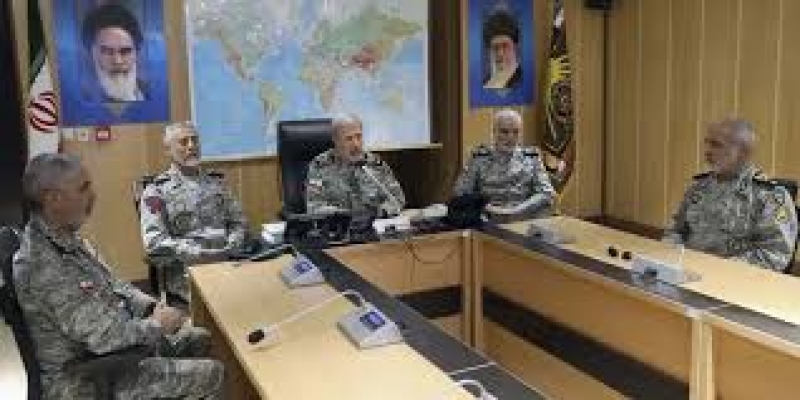- Puppet show enchants Children as Boi Mela comes alive on day 2 |
- DSCC Admin Salam’s drive to make South Dhaka a ‘clean city’ |
- 274 Taliban Dead, 55 Pakistan Troops Killed |
- Now 'open war' with Afghanistan after latest strikes |
- Dhaka's air quality fourth worst in world on Friday morning |
Qatar closes airspace over Iranian threats to US

Qatar temporarily closed its airspace on Monday following growing threats from Iran to retaliate against the United States.
The Qatari Foreign Ministry confirmed the move, describing it as a temporary measure. Qatar hosts the Al Udeid Air Base, a key hub for U.S. military operations in the region, and is also home to the major regional airline Qatar Airways.
Israel on Monday intensified its military campaign against Iran by targeting sensitive symbols of the Iranian regime, including a Tehran prison infamous for detaining political dissidents and the headquarters of Iran’s military force responsible for suppressing recent protests.
Thick black smoke billowed over Tehran after the attacks, while Israel itself faced renewed barrages of Iranian missiles and drones. Such exchanges have become a harsh daily reality for civilians in both nations since Israel launched its offensive to disrupt Iran’s fast-advancing nuclear program.
On the 11th day of fighting, Israeli forces confirmed they had struck “government repression sites” within central Tehran. Israeli officials, however, stressed they had no intention of overthrowing the Iranian regime, their adversary since the 1979 Islamic Revolution.
The Israeli military warned that attacks on Tehran’s military infrastructure would continue "over the coming days," with symbolic locations also becoming targets. The statement, posted on X, comes as Iran faces severe internet blackouts, limiting external communications.
The latest Israeli strikes followed former U.S. President Donald Trump’s controversial remarks questioning Iran's leadership, a day after U.S. stealth bombers targeted three Iranian nuclear facilities.
“If the current Iranian Regime is unable to MAKE IRAN GREAT AGAIN, why wouldn’t there be a Regime change???” Trump posted on his Truth Social platform.
White House Press Secretary Karoline Leavitt later downplayed the remarks, saying Trump was merely posing a question. Nevertheless, Tehran reacted angrily, warning of direct retaliation against American troops or interests, particularly in the already volatile Middle East, where Israel’s conflict with Hamas in Gaza continues.
In Tehran, Israeli missiles damaged the gate of Evin Prison, known for holding dual nationals and Western detainees used by Iran as leverage in negotiations. The prison is also notorious for its political prisoner units, run by the elite Revolutionary Guard, which answers directly to Supreme Leader Ayatollah Ali Khamenei. Both the U.S. and EU have sanctioned the facility.
There were no immediate reports of casualties or severe damage, though the semi-official Tasnim news agency mentioned power outages outside Tehran following the Israeli strikes.
Iranian state television aired footage allegedly from inside Evin Prison, showing the situation under control. However, the Washington-based Abdorrahman Boroumand Center for Human Rights expressed deep concern over detainees' safety, citing family members' fears.
Meanwhile, Iran’s top military officer, Gen. Abdolrahim Mousavi, warned Washington that its actions had granted Iranian forces the “free hand” to strike U.S. interests and personnel.
Tens of thousands of American troops are stationed across the region, many within reach of Iran’s short-range missiles.
Israel also confirmed it targeted roads near Iran's Fordo nuclear enrichment site, aiming to block access. This follows Sunday’s U.S. airstrikes on three key Iranian nuclear locations, including Fordo. Israel provided few details on the attack.
“The Iranian dictator will face the full force of punishment for targeting Israeli civilians,” Israel’s Defense Ministry declared.
An Israeli official, speaking anonymously, said Israel aimed to pressure Iran’s leadership but was not actively pursuing regime change.
Nuclear Tensions Escalate
In Vienna, Rafael Grossi, head of the UN nuclear watchdog, warned of extensive damage to Fordo following the U.S. airstrikes using powerful bunker-buster bombs.
Sunday’s attacks marked Washington’s formal entry into Israel’s conflict with Iran, sparking fears of regional escalation. Tehran denounced the U.S. strikes as crossing a "very big red line."
Iranian officials, including Atomic Energy Organization spokesman Behrouz Kamalvandi, claimed nuclear materials were moved from targeted sites beforehand.
Grossi told the IAEA board Monday that Iran's Foreign Minister Abbas Araghchi had informed him Iran would take "special measures to safeguard nuclear materials." Grossi emphasized that moving nuclear materials within Iran must be declared, but did not confirm compliance.
Iranian state media reported new missile attacks on Haifa and Tel Aviv as part of “Operation True Promise 3.” Explosions were also heard in Jerusalem, with Israeli defense systems believed to be intercepting incoming projectiles. No injuries were reported.
The ongoing conflict has claimed at least 24 Israeli lives, with over 1,000 injured. Iranian casualties are far higher, with the Washington-based Human Rights Activists group reporting at least 950 dead and 3,450 wounded, including civilians and security personnel.
Global Calls for Calm
The U.S. described its strikes on Fordo, Natanz, and Isfahan as one-off operations to cripple Iran's nuclear ambitions but warned of further action if Iran retaliates.
Mousavi accused the U.S. of violating Iranian sovereignty, equating the strikes to an invasion.
Russia, a key Iranian ally, condemned the Israeli and U.S. attacks as "unprovoked aggression." President Vladimir Putin, after meeting Iran’s Foreign Minister in Moscow, called for de-escalation.
Amid international concern, European Union foreign policy chief Kaja Kallas urged a return to diplomacy, stressing that threats to close the Strait of Hormuz—a vital oil transit route—would have catastrophic global consequences.
Iran has repeated its longstanding threat to shut the waterway, further raising fears of broader conflict, reports UNB.

